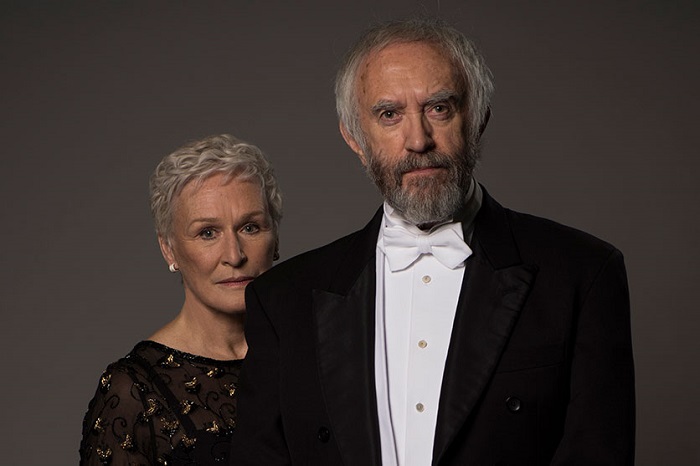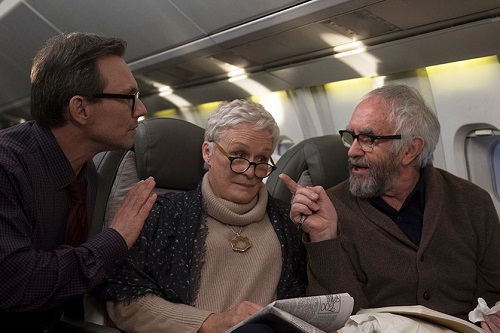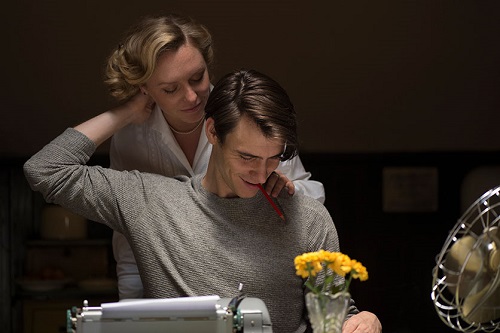

Review: Glenn Close is Female Resentment Personified in ‘The Wife,’ a Drama About Individual Ambition and Marriage's Compromises
By Roxana Hadadi | Film | August 22, 2018 |
By Roxana Hadadi | Film | August 22, 2018 |

Glenn Close has dabbled throughout her career with playing wronged women, and all that experience comes to a head in The Wife. She is the vision of a doting companion, but only at first glance—look closer and the supportive smiles seem pained, a concerned touch transforms into one of ill intent, what is initially patience is actually thinly veiled exasperation. Close is impeccably controlled as a woman who has walked along the edge for a long time, and how she shrugs off layer after layer of mistreatment into finally assuming her own true identity is riveting in The Wife.
In the film from director Bjorn Runge, adapted by screenwriter Jane Anderson from the same-named novel by Meg Wolitzer, Close plays Joan Castleman, the devoted wife of the mega-famous and respected author Joe (Jonathan Pryce). They’re awakened in the middle of the night by the call every fiction author dreams of: Joe has won the Nobel Prize in Literature, and he’s been invited to Stockholm to accept his prize and meet all the other Nobel winners.

Joe’s win sets off a flurry of activity: Joan, who seems to entirely control their domestic life, has to prepare for the trip on top of managing media requests and planning a party to celebrate the news. And she also runs interference between Joe and their son David (Max Irons), an aspiring writer of his own who can’t seem to catch his father’s attention but desperately craves his approval. Of a recent short story, Joan tells her son, “I think it’s beautifully written,” only to be rebuffed immediately for her husband: “What did he say?” David asks. Even to her own son, Joan is the back-up, the understudy, the second seat.
And so the family travels to Stockholm, where they are trailed by the journalist Nathaniel Bone (Christian Slater, returning to his Interview with a Vampire roots), who keeps pestering Joe about writing his biography but who also drops a number of hints about the Castlemans’ relationship, like “I don’t think people give the spouse enough credit.”
“There’s nothing more dangerous than a writer whose feelings have been hurt,” Joan warns Joe, and we see that she means not only the potential danger of Nathaniel Bone (which is a great porn name, by the way), but that she’s speaking from experience: The film jumps back to 1958, to Smith College, when Professor Joseph Castleman (played by Harry Lloyd, who you may recognize from receiving that “crown fit for a king” on Game of Thrones) notices a particular young woman in his writing class — the forward, outspoken Joan (the stellar Annie Starke). “I see I’m gonna have to watch out for you,” Castleman says, and the attraction between the two—already tinged with competitiveness—is undeniable.
But decades later, what defines this marriage? Is it a partnership, or punishment? Joe insists to Joan “We still have a wonderful fucking life,” but everything about Joan—her facial expressions, her body language—bristle at that. When Joe says of Joan, “Without this woman, I am nothing,” her face is noticeably blank; when Nathaniel tries to engage her in conversation, she rebuffs him with “I’m very comfortable standing here in my own thoughts”; when one of the Nobel staff tells her and the other wives, “I can arrange for shopping and beauty treatments,” her shrug is one of disdain. The few times Joan smiles feel like a mistake.

Close moves between these reactions fluidly and intentionally, and although she’s mostly operating at this combination of resigned and bemused, you know she’s always thinking, always operating under these surface interactions, always planning a move in advance. “Please don’t paint me as a victim. I’m much more interesting than that,” she says to Bone, and how Starke manages to evoke Close throughout flashbacks in the 1950s and 1960s gives the character a nice cohesion.
Close is surrounded by other actors who help her zig and zag; she and Slater have an unexpectedly good chemistry, and her interactions with Pryce are loaded with decades of history, both good and bad. But so much of their relationship can be understood from the film’s opening scene, in which Joe eats a cookie in bed before propositioning Joan for sex, attempting to persuade her with “Come on, you don’t have to do anything, just lie there.”
Joan acquiesces despite her initial reservations, and Joe ultimately has his way. That’s the dynamic for the majority of their marriage, but The Wife examines what happens when that façade drops, when Joan finally decides to fight back against the presentation of herself as a “long-suffering wife.” Close is female resentment personified in The Wife, and the early Best Actress Oscars buzz is well-deserved.
← Three Kings Is A SubReddit For Performing Questionable Supernatural Rituals | 'It's Always Sunny in Philadelphia' Trailer: Fat Mac is Now Jacked Mac →
More Like This
'The Gentlemen' Review: Ritchie's Latest Episodic Caper is a Blast for Fans of his Formula
Kristen Stewart's 'Love Lies Bleeding' Is Gonna Kick Your Ass And Make You Beg For More
What the Hell Is Going On in Apple TV+'s 'Constellation'?
‘Shōgun’ is TV’s Next Big Epic
It's Not the Filmmakers' Fault that Bill Belichick Sucks in 'The Dynasty: New England Patriots'

What’s Old Is New Again: Old Hollywood Glamour Glitters at the 2024 Oscars
Al Pacino Presents Best Picture Oscar, Confuses Everyone
The Dangerous Lie Of 'TradWives'
A Legendary Horror Franchise Is Headed To Television
'The Mandalorian' Season 4 Is Probably Not Happening
Halle Bailey On Why She Chose To Keep Her Pregnancy Private
More Like This
'The Gentlemen' Review: Ritchie's Latest Episodic Caper is a Blast for Fans of his Formula
Kristen Stewart's 'Love Lies Bleeding' Is Gonna Kick Your Ass And Make You Beg For More
What the Hell Is Going On in Apple TV+'s 'Constellation'?
‘Shōgun’ is TV’s Next Big Epic
It's Not the Filmmakers' Fault that Bill Belichick Sucks in 'The Dynasty: New England Patriots'
Reviews